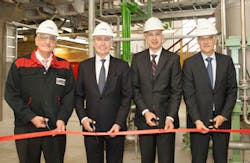Specialty-chemicals company LANXESS says it’s completed expansion of its Baypren polychloroprene solid rubber production operations in Dormagen.
There, dry-finishing production technology is developed, tested and made market-ready by LANXESS, enabling Baypren to be manufactured in a more resource-friendly way. LANXESS also added two new variants of this high-performance synthetic rubber to its product portfolio at the Dormagen site. The company says it has invested some EUR 18 million in expanding production.
Werner Breuers, member of the LANXESS AG board of management, and Jan Paul de Vries, head of LANXESS’ high-performance elastomers business unit, officially inaugurated the production line. "This investment is further proof of our leading know-how in the field of high-performance synthetic rubber," Breuers says.
The dry-finishing technology reduces production steps and conserves resources by, among other things, dehydrating the rubber in an extrusion device. Less water is required and less wastewater is generated. Natural gas isn’t needed to dry the rubber so less waste air is produced.
"Our new ‘Baypren Green Finishing’ grades feature enhanced cross-linking, while ‘Baypren High Performance’ benefits from further optimized flow behavior. These properties help increase the speed of the injection-molding process for technical moldings and reduce energy consumption," de Vries says.
Dormagen annual production capacity was increased by some 10 percent to a total of 63,000 metric tons of solid rubber.
The Baypren facility employs some 250 staff. HPE is part of LANXESS’ Performance Polymers segment, which recorded sales of EUR 4.5 billion in fiscal 2013. LANXESS had sales of EUR 8.3 billion in 2013. Roughly 17,000 employees in 31 countries work at 52 production sites worldwide. Its core business is development, manufacture and marketing of plastics, rubber, intermediates and specialty chemicals.
Oil & gas co. implements ERP
Apply Sørco, a Norwegian multidiscipline engineering and contracting company in the oil and gas industry, has implemented IFS Applications for EPCI contractors. Among the benefits to be expected are enhanced data quality, more efficient project, resource and risk management, as well as reduced IT complexity.
Headquartered in Stavanger, Norway, Apply Sørco has its background in multidiscipline engineering, offshore construction and contracting, focusing on upgrading the performance of on- and offshore oil and gas facilities.
Following an efficient and on-time 13-month implementation project, IFS Applications has been deployed for some 900 users in Apply Sørco, with projects being managed worldwide. The IFS solution has replaced a large number of standalone legacy systems to offer integrated, real-time control of processes such as engineering, construction, project management, supply chain, HSEQ, financials and HR.
The solution has also enabled enhanced resource management, ensuring smooth deployment of engineering services and delivery of systems to customer sites all over the world without increasing the back-office headcount.
"The implementation is a strategic initiative to ensure more efficient project execution throughout our value chain," Apply Sørco Senior Vice President Tove Tyberø said.
Apply Sørco focuses its activities on upgrading performance of oil and gas facilities offshore and onshore. With some 1,600 employees, Apply has subsidiaries in three business areas: upstream facilities, living quarters & helidecks and rig & modules.
IFS develops and delivers business software for enterprise resource planning (ERP), enterprise asset management (EAM) and enterprise service management (ESM). IFS is a public company founded in 1983 and has over 2,600 employees. IFS supports more than 2,200 customers worldwide from local offices and through partners in more than 60 countries.
Metal powders for additive manufacturing
Toolcraft of Georgensgmund, Germany is a specialist manufacturer of high-end precision metal parts and components. It has turned to LPW Technology to source optimized, competitively priced powders for exacting additive manufacturing (AM) applications. Toolcraft manufactures micro-components used in biomedical, defense and other industries.
Christoph Hauck, managing director of Toolcraft says LPW is able to analyze powders under the conditions needed to provide relevant data for additive manufacturing, to use these data to help us identify an optimized powder for a specific additive manufacturing application.
Additive manufacturing (AM) is a highly efficient metal manufacturing technique. It involves ‘printing,’ often intricate components, by building up powder layers, which are then melted or sintered together. The properties of the metal powders used directly impact the efficiency of additive-manufacturing processes and, crucially, the mechanical properties of the finished component.
Toolcraft delivers a comprehensive manufacturing service that includes 3-D printing, wire cutting, machining and non-invasive quality assurance testing. Many of the company’s customers are in the medical technology and aerospace sectors, which require the use of certified materials. For applications in these industries, a secure supply of certified powders and the ability to produce components to extremely precise specifications are key.
